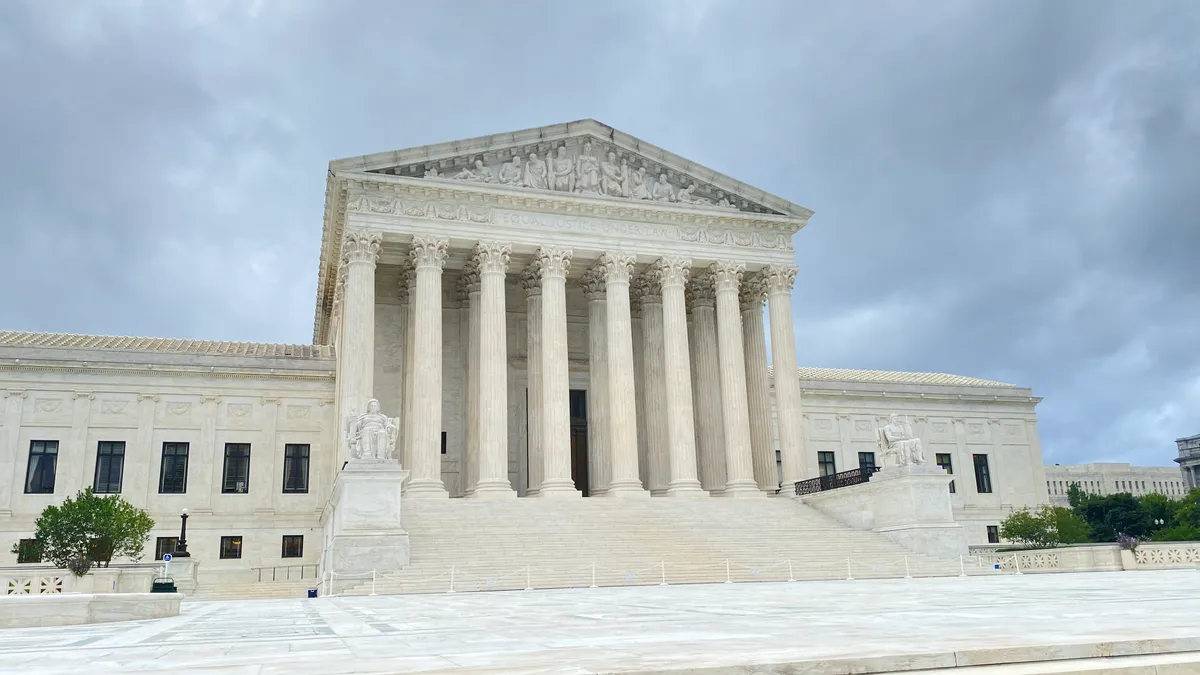Dive Brief:
- The federal government can file a motion to dismiss a False Claims Act lawsuit brought on its behalf by a whistleblower even if it initially allowed the case to proceed, the U.S. Supreme Court ruled last week.
- The 8-1 decision requires the Department of Justice to take over a case before it can file a motion to dismiss, but it doesn’t have to take over the case during the early period when it’s under seal. Rather, it can take it over later and then dismiss it, and courts should give deference to DOJ’s preference as long as the agency justifies its reasons and takes into consideration the whistleblower’s position.
- In his dissent on the grounds that DOJ must intervene while the case is under seal, Associate Justice Clarence Thomas raised a broader question of whether whistleblowers should be allowed to sue on behalf of the government. Associate Justices Amy Coney Barrett and Brett Kavanaugh agreed with Thomas that the court should look at the constitutionality of such qui tam plaintiffs.
Dive Insight:
Acting as a whistleblower, Jesse Polansky filed a False Claims Act lawsuit in 2012 against Executive Health Resources on the grounds it was helping hospitals get more money from Medicare by improperly charging inpatient rates on services that were conducted on an outpatient basis.
Over Polansky’s objections, DOJ in 2019 filed to dismiss the case, even though it had waited until after the seal period was lifted to take over the case, arguing it would be too resource-intensive to proceed and faced difficult, privilege-related discovery issues.
The U.S. District Court for the Eastern District of Pennsylvania agreed with DOJ. The U.S. District Court of Appeals for the 3rd District upheld the ruling.
In her majority opinion, Associate Justice Elena Kagan disagreed with DOJ that it could have dismissed the case even had it not taken it over first. The agency first must take over the case, also called intervening in the case, but it doesn’t have to do it while the case is under seal. It can do it later. Once it does, it can move for dismissal as long as it provides, under Rule 41 of the Federal Rules of Civil Procedure, notification and an explanation of its rationale, including how it took into account the whistleblower’s interests.
Then, once it moves to dismiss, courts are expected to give deference to DOJ’s position, because it’s the entity with the sole interest in the lawsuit, even though whistleblowers are entitled to a share in any recovery.
“If the Government offers a reasonable argument for why the burdens of continued litigation outweigh its benefits, the court should grant the motion,” Kagan said in the majority opinion. “And that is so even if the [whistleblower] presents a credible assessment to the contrary.”
Surge of claims
DOJ has been under pressure to choose which cases it takes over. The number of FCA whistleblowers cases has surged in recent years, with hundreds now filed each year — too many for the agency to manage reasonably.
The surge has been a blessing and a curse. Whistleblowers account for the bulk of charges brought under the FCA. That has enabled the federal government to recover from companies some $70 billion in fraudulently generated revenue.
But in some cases, the cost of the government taking over the case outweighs the recovery it could generate.
Constitutional question
In his dissent, Thomas disagreed with the majority that DOJ can take over the case after the seal period ends and then dismiss it.
“The text and structure of the False Claims Act afford the Government no power to unilaterally dismiss a pending … action after it has ‘decline[d] to take over the action’ from the [whistleblower] at its outset,” he said.
But Thomas also pointed to the bigger-picture issue of whether whistleblowers should be allowed to act on behalf of the federal government.
By serving as qui tam plaintiffs, Thomas said, whistleblowers are private parties being given the power to leverage the interests of the government when they sue under the FCA, something that doesn’t appear consistent with Article II of the Constitution.
“There is good reason to suspect that Article II does not permit private [whistleblowers] to represent the United States’ interests in FCA suits,” he said.
Although Kavanagh, in a concurring opinion, agreed with the majority that DOJ can move to dismiss no matter when it takes over a case, he agreed Thomas’ Constitutional question should be looked into. Barrett joined Kavanaugh in his concurring opinion.











